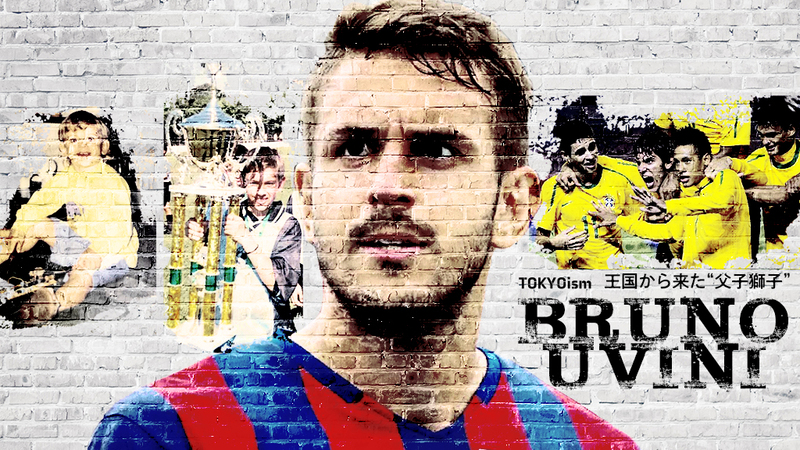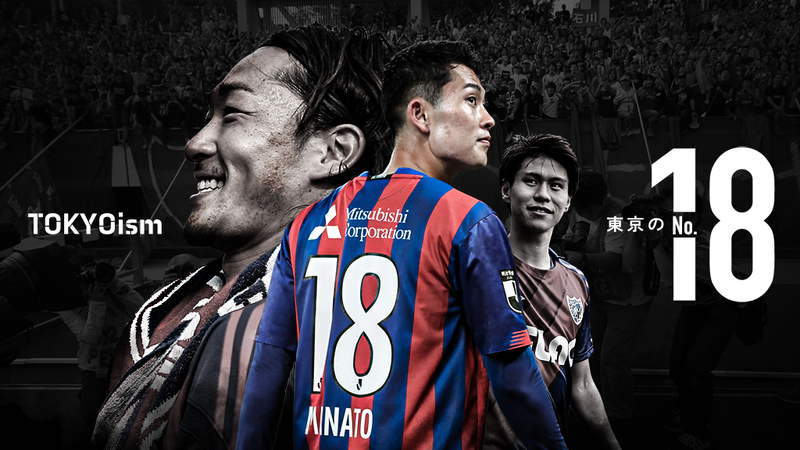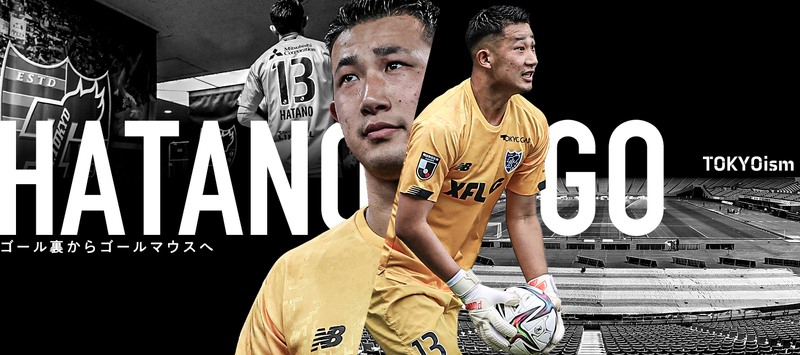In the past, there was "King" Pelé. And in recent years, there is Neymar. In Brazil, it is not uncommon for there to be professional soccer players spanning two generations in the same family.
Bruno Uvini is also one of those who follows in that lineage.
Inherited from his father, who also lived as a center back, is not only his talent in soccer, but also his fighting spirit and captaincy. In a soccer kingdom where only technique is not enough to survive, Bruno has honed his strength of a lion.
"Father and son lions" who conquered the world as representatives of the "Kingdom" Brazil, experienced glory and hardship, and chose blue and red in a new land. This follows their journey and determination.
Captain who leads world-renowned players
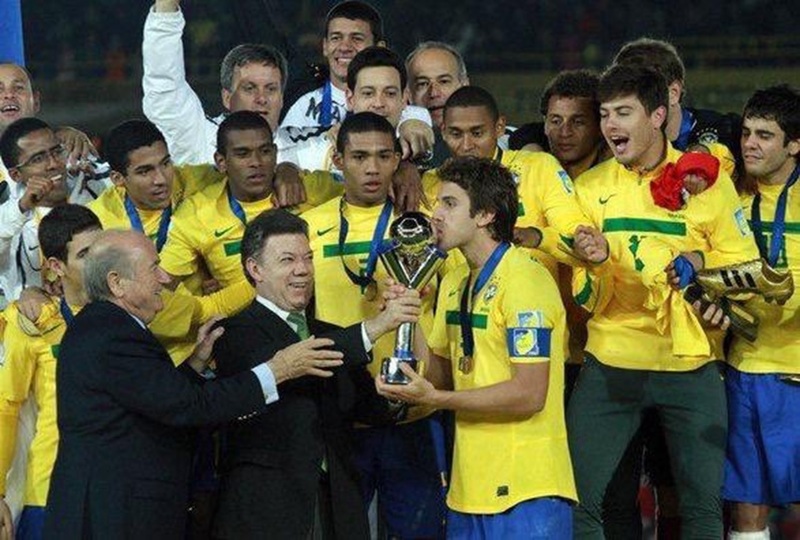
Just like breathing air, in the largest football nation in South America, there are many expressions related to football in daily life.
One of the ways to describe a good start is to say "start with your right foot", but Bruno firmly stepped out with his right foot in Japan, 17,000 kilometers away from his home country.
On April 28, 2021, the match between Tokushima Vortis and YBC Levain Cup Group Stage Sec. 4 was held at the enemy's ground. In the second half, after chasing one point, Leandro scored a header shot from the left CK.
Despite losing their balance, Bruno showed a joyful expression after scoring the equalizing goal with his determination. However, what he values the most is his professional skills and attitude towards soccer.
"The most important thing as a goalkeeper is to not let the opponent score."
"From my teenage years, I have always strived to have the dedication to team play while maintaining the pride of being a "defender".
Casemiro (Real Madrid) and others contributed to the victory in Copa São Paulo, the gateway to the development age, at São Paulo FC during their U-20 days. In the Brazilian national team of the same age group, they fought alongside Neymar, Coutinho, Oscar, and others, and won the U-20 South American Championship and the U-20 World Cup in 2011, with Bruno always wearing the captain's armband on his left arm.
It is a difficult task to lead the candidates who have a habit of thinking that they are the best in the world. Not only their skills on the pitch, but also their personality is necessary to be recognized as a captain in Brazil.
Mental Strength Built from Humiliation
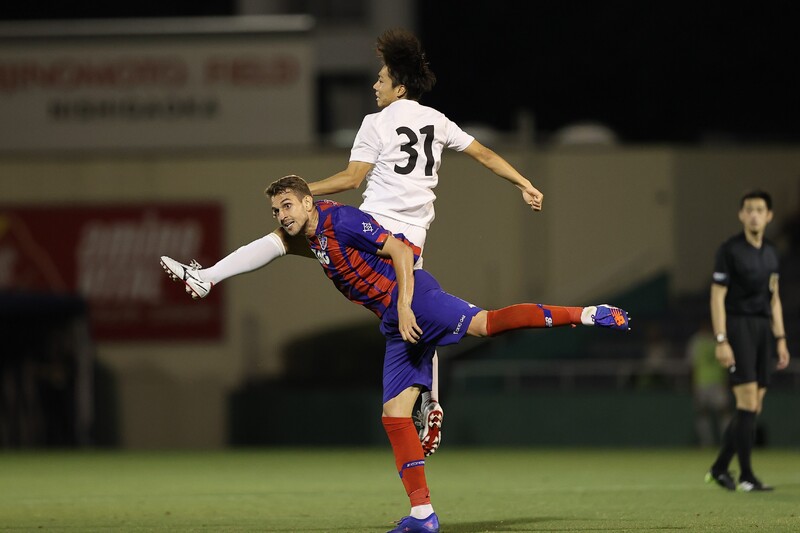
Since passing the entrance exam for the youth team of São Paulo FC, he has had a successful career as a super elite and in 2012, he added the title of "Seleção" to his resume. However, in Japan where he was supposed to enter smoothly with his "right foot", an unexpected pitfall was waiting.
"I've always wanted to quickly step onto the pitch and respond to the feelings of the fans and supporters."
From the beginning of joining FC Tokyo, I have retweeted and reacted to posts from fans and supporters on my Twitter and other platforms, because of the strong feelings I have towards those who support me.
The Emperor's Cup 2nd Round match against Toyo University at Ajinomoto Field Nishigaoka was their debut match at home. They were determined to deliver a victory to their fans and supporters, but the team ended up suffering an unexpected defeat.
Bruno, who had to leave the pitch near the end due to a broken tooth from contact with the opponent, heard the unwanted final whistle. Looking back on his career, he has never lost to an amateur opponent in an official match.
Bruno experienced the humiliation of allowing a hat-trick to Messi in the 2012 Argentina match, when he first wore the Brazilian national team uniform, even though he did not feel it when he lost 3-4 after playing the full game.
"For a big club like Tokyo, it was never an acceptable result. There is no excuse for that outcome. There is only sadness, but we can only say that we will not repeat the same thing again."
He looked back on his debut match at home as if reminding himself, but despite his glamorous career as a former Brazilian national team player, he is a man who has also tasted the bitterness of not being able to play for a big club.
His gaze was already focused on the next battle. Immediately after losing to Juntendo University in the Emperor's Cup, the first person he reported his frustration to was his father. "My father is a tougher coach than Kenta HASEGAWA," he said, referring to the mental strength he had been trained since childhood, which should not break from just one loss.
Glory and Struggle of Youth
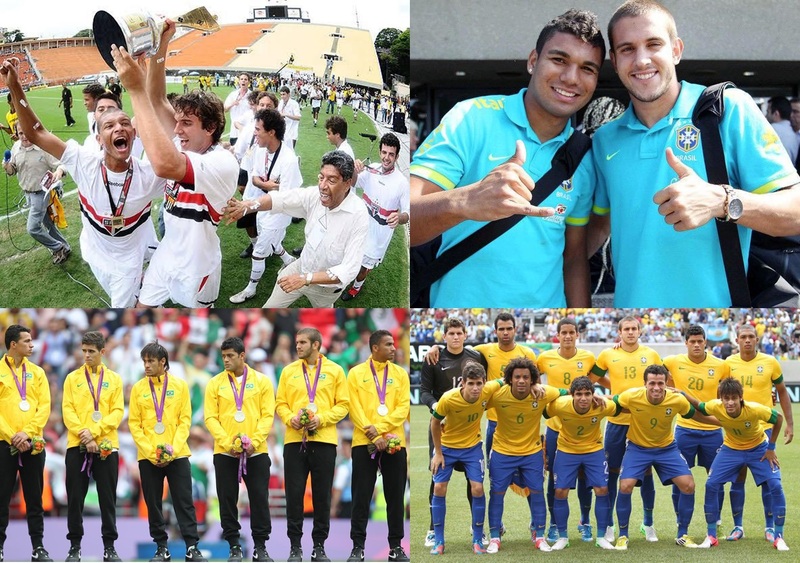
"Like father, like son" is a common expression in Japan, but there is a similar proverb in Brazil as well.
Like father, like son.
Bruno's father, Tuka, was a professional player who played as a center back for the prestigious Ponte Preta, although he did not reach the Seleção. Bruno, who was born in the countryside town of Capivari, about 400 kilometers away from the largest metropolis in South America, São Paulo, began his soccer career at the soccer school "Pinta de Crack" opened by his father.
Tuka's goal is not to make a profit or develop future professional players, but rather to teach children about human education and the greatness of sports.
Only Tuka, who knows firsthand that being a professional soccer player is not a stable career, had Bruno kick the ball not with the intention of pursuing a professional career, but to prevent him from getting addicted to video games and the internet.
Bruno, who had been kicking the ball since he was 4 years old, had a clear message for his mother when he was 11 years old.
"Mommy, I'm going to become a soccer player."
In his early days, he played in attacking positions such as midfield, but what stood out even then was his disciplined play and dedication to the team. As his physical strength grew year by year, his coaches at the time saw that he was suited for the role of a defender.
At the age of 14, I was scouted by a club called Ponte de Asucar, known for its development, and decided to leave my parents and live in São Paulo. However, the bond between Brazilian parents and children is much stronger than Japanese people can imagine.
"Even now, at 30 years old, my mother still doesn't like living far away," Lucas laughs wryly, but one routine he never skips before a game is calling his mother to pray that his child will stand on the pitch without injury. When he scored at Ponte de Asúcar, his mother was in tears of sorrow, but Tuka-san, who knew her son's determination, encouraged him like this.
"If you want to succeed, have a strong mindset and do your best every day with sincerity. If you have your own beliefs and feelings, you will definitely succeed."
São Paulo FC, which has one of the best youth development systems in recent years in Brazil, noticed a boy born in Capivari who had begun to show his talent at Ponte Preta.
At the youth academy of São Paulo FC, which has produced numerous Brazilian national team players such as CACA, Oscar, Casemiro, and Lucas Moura, a daily battle for survival awaited.
"In São Paulo, new players join the youth teams from all over Brazil every week. So, there is fierce competition and in order to become a professional, you have to win all the tournaments in the youth teams. It's a common saying in the football world, but it's like having to defeat a lion every day."
From my father, I received advice and mindset as a center back, and sometimes he would give me harsh words that were close to insults, but we walked together as "father and son lions" instead of "father and son hawks". For Bruno, Tuka-san was not only an admired soccer player, but also the best coach.
"He is my role model and still the most demanding coach. Even now that I have become a professional, I sometimes get scolded and receive harsh words."
Bruno, who also happens to be my mentor, greatly respects his father. However, on the pitch, he has achieved numerous titles that his father, Tuka, was unable to obtain.
On January 25, 2010, at the Pacaembu Stadium in the city of São Paulo, under a clear blue sky, Bruno was basking in the joy of his first career victory.
A Champion (Champion). The Copa São Paulo, in which 92 clubs from all over Brazil participate, is a tournament that attracts attention from all over Brazil and is a gateway for young players, held on the anniversary of the city of São Paulo. Bruno, who won the championship with Casemiro, raised the trophy as captain. In the stadium, there was Tuka-san, who had stood on the stage of the final as a member of Ponte Preta in his younger days, but ended up as runner-up.
"My father told me before the game, 'Do your best, my son. I could only get second place, but now it's your turn. Go and win the championship.' It's still a strong memory for me."
Bruno, who won the title that his father could not get, was expected to be a hope to support the next generation of Brazil, not only for São Paulo FC but also for players like Neymar and Coutinho.
However, at that time, San Paulo FC's center-backs were filled with top players from Brazil such as Miranda. As it is a position that values experience, the young prodigy who shone in the U-20 World Cup as the world's best did not have many opportunities and spent days of agony. He went to Europe at a young age and was also a member of prestigious clubs such as Tottenham and Napoli, but here too he was blocked by experienced players.
Despite having a prestigious career, including appearances for the Brazilian national team and a silver medal at the London Olympics, I have not always been able to satisfy the pride of being a former Seleção player in my home country and Europe.
Thoughts on Japan. Unexpected Connection with Amaral
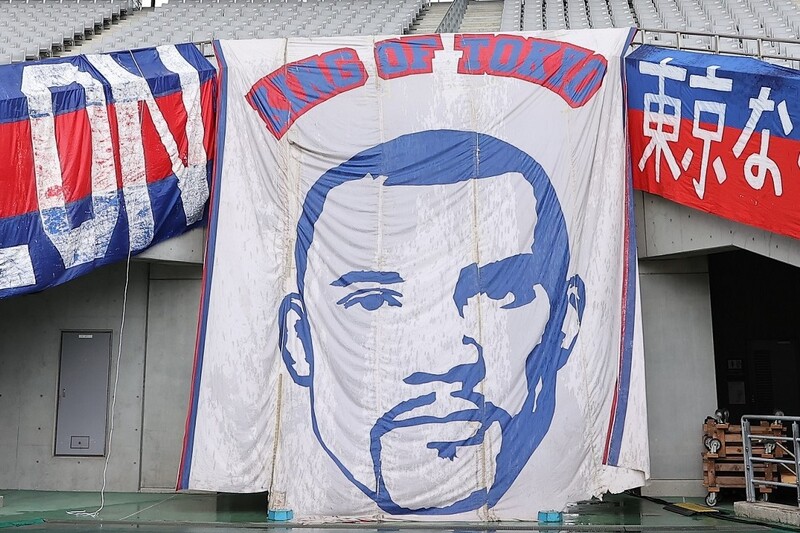
Bruno, who spent his last season in his 20s in Saudi Arabia, also won the league championship as captain of the prestigious Al Nasr. He spent his career's best moment in the Middle East.
He fulfilled his dream of becoming a professional soccer player and even achieved his grand goal of becoming a member of the Brazil national team, which he jokingly told his mother when he was a boy. Since leaving his hometown of Capivari at the age of 14, Bruno has faced many challenges and also tasted success. One of his remaining dreams was to play in Japan.
"I have had the opportunity to come to Japan and play twice before. Once when I was 16 years old and part of the youth team for São Paulo, and the other time when I came to Japan for the Sendai Cup as a member of the U-20 Brazil national team. When I first came to Japan as a member of São Paulo, I was fascinated by this country. I always wanted to play in Japan."
That word is definitely not just a social nicety.
Leandro DAMIAO, who was a teammate in the Brazilian national team at the London Olympics, and Joao SCHMIDT, who was also a junior in the youth academy of Sao Paulo FC, were in frequent contact to gather information about the J-League.
And from Leandro DAMIAO, he heard that "Bruno, playing in the J-League is not easy because it is a highly competitive league. Japanese players play with great dedication and every game is difficult." However, he also said that "Japan is a wonderful country and a place to know."
Not only FC Tokyo, but also what is common among successful Brazilians in Japan is their dedicated attitude. Bruno is already aware of the lineage of the predecessors born in the kingdom who once fascinated fans and supporters with their personalities, such as Amaral and Lucas.
"I must thank the Brazilian predecessors for this. Because they did a good job at this club, they opened the way for us."
And when the topic shifted to Amaral, he revealed an unexpected connection.
"As for Amaral, it's a coincidence, but he lives near my hometown of Capivari and he even knows my father. Amaral used to play for a club in Capivari called Capivariano. It's an unbelievable story, right? So when I decided to transfer to Tokyo, Amaral said, 'I can't believe Bruno will play in Tokyo. How amazing is that?'"
Bruno, who is seeing the large banner "KING AMARAL STADIUM" and the flag with Amaral's face and the words "KING OF TOKYO" displayed in the goal end stand of Ajinomoto Stadium, now swears in his heart for success with FC Tokyo.
"Amaral is really loved by this club. There is also a flag at the stadium that says 'KING OF TOKYO'. I saw it at the stadium and it was a fantastic sight. It's not easy for a Brazilian to earn that kind of respect in a foreign country."
A man of words and actions paints the future
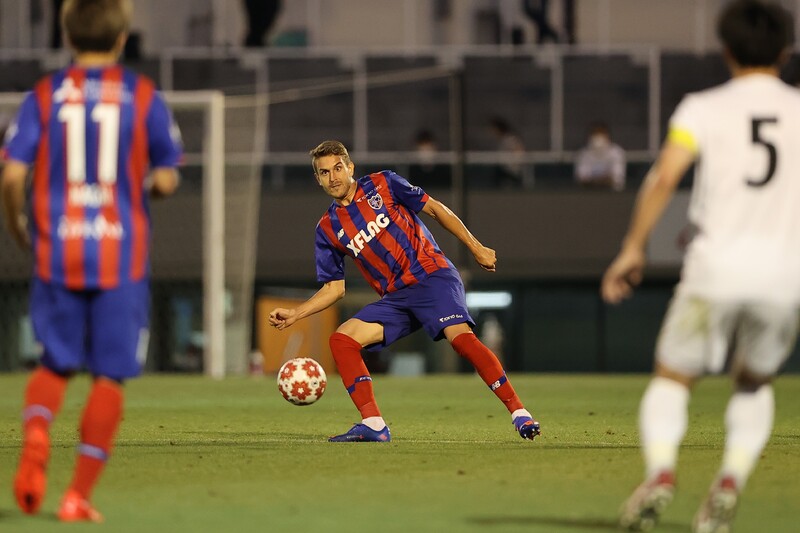
This transfer is by no means a temporary one, as shown by his efforts off the pitch. While feeling reassured by the presence of fellow countrymen such as Diego OLIVEIRA and Leandro, who he has faced as opponents during his time in Brazil, he also aims for a quick fit by intentionally having lunch with Japanese players in the clubhouse after practice and learning Japanese online.
During the scene when Bruno went to the police to obtain an international driver's license, he proudly smiled.
"I was asked by the police for my date of birth, and I answered in Japanese, 'June 3, 1991'. As a center back, I have to give instructions in Japanese and I can also say things like 'dangerous' or 'behind' or 'left' or 'right' or 'clear', which are Japanese words that I learned first, especially for defense."
Akihiro HAYASHI and Go HATANO have been close since the beginning of their joining, and even teased by Go HATANO who speaks Spanish, they have increased their sense of fit off the pitch. They are well aware that the upcoming J1 League and Levain Cup, which will be a battle for consecutive victories, will be a chance to overcome the frustration they felt in the Emperor's Cup.
Bruno Uvini is a man of action.
"Respect your teammates and always play for the team," my father instilled in me, and I have achieved many dreams with that style.
Now, wearing the blue and red uniform of the capital club in Japan, all Bruno desires is the glory of Tokyo.
"It's about winning and lifting the trophy. To leave positive memories in this club, I need to become a champion. Tokyo, who gave me a chance, has the power to become a champion. There is also a chance for back-to-back wins in the Levain Cup, and I feel that this is a club with a lot of potential."
Number 5, who is also known as "Lionheart" in Tokyo, hopes to be called by that nickname. The "father and son lions" who grew up in Brazil are determined to show their lion-like performance on the blue and red final line.
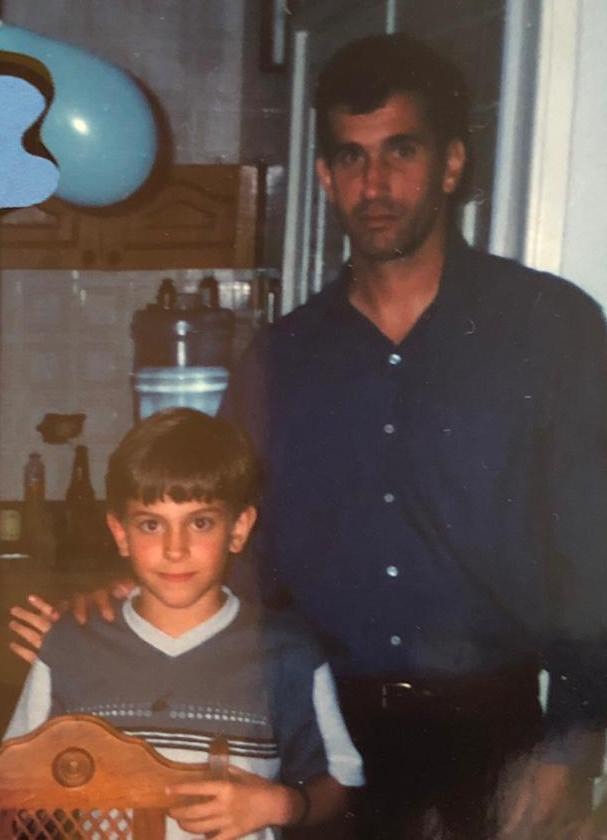
Height/Weight: 186cm/84kg
Place of Birth: Brazil
Career: São Paulo FC (Brazil) → Tottenham Hotspur FC (England) → SSC Napoli (Italy) → SS Robur Siena (Italy) → Santos FC (Brazil) → FC Twente (Netherlands) → Al Nasr SC (Saudi Arabia) → Al Wakrah SC (Qatar) → Al Ittihad (Saudi Arabia)
Interview and Text by Masaki SHIMOZONO
Photo by Kenichi ARAI
Photo Cooperation by Bruno UVINI
Direction by Tomoo AOYAMA
